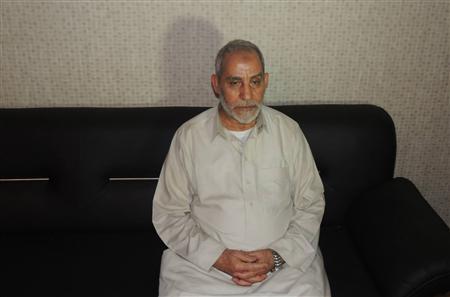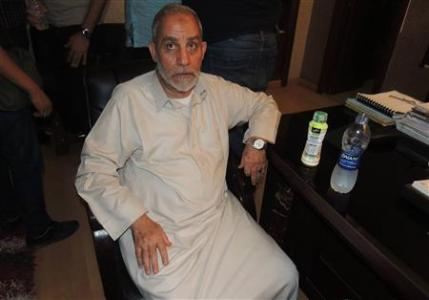www.aljazeerah.info
News, August 2013
Archives
Mission & Name
Conflict Terminology
Editorials
Gaza Holocaust
Gulf War
Isdood
Islam
News
News Photos
Opinion Editorials
US Foreign Policy (Dr. El-Najjar's Articles)
www.aljazeerah.info
|
Editorial Note: The following news reports are summaries from original sources. They may also include corrections of Arabic names and political terminology. Comments are in parentheses. |
Mohamed Badie', Murshid (Supreme Leader) of Egyptian Musllim Brotherhood, Arrested in Cairo
 |
 |
In relentless campaign, Egypt arrests Muslim Brotherhood leader
By Tom Perry and Shadia Nasralla
Tue Aug 20, 2013 11:29am EDT
CAIRO (Reuters) -
Egypt's army-backed authorities detained the Muslim Brotherhood's leader on Tuesday, signaling their determination to crush the group and silence protests against the ousting of Islamist President Mohamed Mursi.
The arrest of Mohamed Badie, 70, the Brotherhood's general guide, followed the bloody suppression of rallies demanding the reinstatement of Egypt's first freely elected president, who was toppled by the military last month.
Egypt is enduring the worst internal strife in its modern history, with about 900 people killed, including 100 police and soldiers, after security forces broke up protest camps by Mursi's supporters in the capital on August 14.
A spokesman for a pro-Brotherhood alliance put the death toll amongst its followers at about 1,400.
The turmoil has alarmed the United States and the European Union, but Israel and some Gulf Arab states led by Saudi Arabia have pressed the West not to punish Cairo's new rulers.
Qatar, the only Gulf state seen as sympathetic to Mursi, sent another tanker of liquefied natural gas to energy-strapped Egypt this week despite the army takeover.
Badie was charged in July with incitement to murder in connection with protests before Mursi's ouster and is due to stand trial on August 25 along with his two deputies.
Footage shown on local media showed the bearded leader sitting grim-faced in a grey robe near a man with a rifle following his detention in Cairo in the early hours.
The release of the images seemed designed to humiliate the Brotherhood chief, whose arrest means the group's top echelon is now behind bars, with other leaders dropping out of sight.
MUSCLE
After decades as an outlawed movement, the Brotherhood emerged as the best-drilled political force following President Hosni Mubarak's fall in pro-democracy protests in 2011.
Now the state accuses it of al Qaeda-style militancy and subversion, charges it vehemently denies.
Founded in 1928, the Islamist group used its organizational muscle to secure victory for Mursi in last year's presidential election. It says it has about a million members among Egypt's 85 million people, as well as offshoots across the Arab world.
The whereabouts of many other senior Brotherhood politicians are unknown. Those who had been posting frequently on social media have stopped in the last two days. Arrests have extended beyond Cairo, netting provincial leaders of the movement.
The Brotherhood condemned the detention of Badie, whose 38-year-old son was killed in Cairo clashes on Friday, and denied reports that it had appointed a temporary leader.
"When the hand of oppression extends to arrest this important symbol, that means the military coup has used up everything in its pocket and is readying to depart," it said.
The state news agency said Badie was now in Cairo's Tora prison, where other Brotherhood leaders are held. Mubarak is also jailed there, though legal moves to release him are afoot.
A court will examine a bail petition for Mubarak, 85, on Wednesday, judicial sources said.
Freedom for the man who ruled Egypt for 30 years could stir more political tension in the most populous Arab nation, where his former Islamist foes are now being hunted down.
Mursi has been held in an undisclosed location since the army toppled him following mass protests against him.
"FIGHTING TERRORISM"
Tamarod, the youth organization which orchestrated the street campaign against Mursi, hailed Badie's detention as "an important step on the path of the revolution, fighting terrorism and dismantling the terrorist group by arresting its leaders".
The Brotherhood, which renounced violence decades ago, has promised peaceful resistance to the army takeover.
United Nations Secretary-General Ban Ki-moon called on the authorities to release Mursi, or at least ensure a transparent process for him. He also said on Monday that the "very limited" political space for the Muslim Brotherhood should be expanded.
The United States urged Egypt not to ban the Brotherhood, an option floated in the past week by the interim prime minister.
Jeffrey Feltman, U.N. under-secretary for political affairs, arrived in Egypt on Tuesday for talks that Ban had said would focus on initiatives to restore peace and forge reconciliation.
Egypt began three days of official mourning for 25 policemen killed on Monday by suspected Islamist militants in the Sinai near the desert border with Israel. State television carried emotional demands for retribution against the Brotherhood.
The off-duty policemen were returning to their barracks in Rafah when militants attacked them. The government said the men had been forced from their vehicles and shot in cold blood.
The army said on Tuesday it had captured 11 "terrorist elements" in Sinai, including two Palestinians.
The United States, a close ally of Egypt since it signed a peace treaty with Israel in 1979, said on Monday it was still reviewing whether to freeze any of its $1.55 billion annual aid package to Egypt, which mostly funds U.S. weapons supplies.
Washington also voiced concern about the deaths on Sunday of 37 detainees who authorities said were suffocated by tear gas during an escape attempt. The circumstances remain unclear.
The pro-Brotherhood alliance condemned the Sinai attack, which it accused the "security apparatus of the coup government" of carrying out to divert attention from the deaths of the 37 men who had been in transit to Abu Zabal prison near Cairo.
The alliance also called for a consumer boycott of businesses and states that "support the bloody military coup".
Foreign ministers of the European Union, another donor to Egypt, meet in Brussels on Wednesday to discuss how it might apply its influence for a peaceful compromise.
However, Egypt's interim government, buoyed by considerable popular support, as well as diplomatic backing from Israel and Saudi Arabia, which has promised to make up for any shortfall in Western aid, has said it will resist any outside pressure.
(Additional reporting by Lin Noueihed, Asma Alsharif, Crispian Balmer, Yasmine Saleh and Omar Fahmy in Cairo, Michele Nichols at the United Nations and Arshad Mohammed in Washington; Writing by Alistair Lyon; editing by Anna Willard)
Egypt arrests Muslim Brotherhood leader Badie
France 24, August 20, 2013, AFP
By News Wires (text)
Egyptian authorities announced on Tuesday they had arrested the Muslim Brotherhood's supreme leader Mohamed Badie, as they escalated their campaign to crush the party of ousted president Mohammed Morsi.
Egyptian authorities said Tuesday they had arrested the supreme guide of the Muslim Brotherhood, as they stepped up a campaign to crush the party of ousted president Mohamed Morsi.
The arrest stoked fears of an escalation in the already tense situation in Egypt, where nearly 900 people have died in days of clashes nationwide between security forces and Islamist supporters of Morsi.
In the latest bloodshed, militants killed 25 policemen in the restive Sinai Peninsula, just hours after 37 Muslim Brotherhood prisoners died in police custody.
The interior ministry said police picked up Brotherhood chief Mohamed Badie, 70, near Rabi'a al-Adawiya square, where more than 200 Morsi supporters were killed on Wednesday as police cleared their protest camp.
Senior members of the Muslim Brotherhood organisation, including Badie, have been accused by Egypt’s military-backed authorities of inciting the violence that the deaths of protesters.
And judicial sources said fresh accusations had been levelled against Morsi himself, who has been held in a secret location since the military deposed him on July 3.
Meanwhile, former president Hosni Mubarak won conditional release in the third of four cases against him, but remained in detention on the fourth.
The bloodbath sparked by the crisis showed little sign of abating as militants fired rocket-propelled grenades at two buses carrying police in Sinai on Monday—the deadliest attack of its kind in decades.
The interior ministry blamed the attack on "armed terrorist groups" and officials later said the border with the Palestinian Gaza strip, near where the attack occurred, would be closed.
Security sources said another policeman was killed in the northern city of El-Arish, bringing to at least 75 the number of security force members killed in Sinai since the army toppled Morsi.
The attack followed the death of 37 Muslim Brotherhood detainees as they were being transferred to a north Cairo jail.
Authorities said they died after police fired tear gas in a bid to free an officer taken hostage by prisoners.
But the Brotherhood, the once-banned movement from which Morsi hailed, held the police accountable, accusing them of “murder”.
They said the incident affirmed “the intentional violence aimed at opponents of the coup, and the cold-blooded killing of which they are targets”.
United Nations chief Ban Ki-moon said he was “deeply disturbed” by the deaths and called for a “full investigation to ascertain the facts surrounding this incident.”
The “right path”
The fresh wave of unrest came hours after military chief Abdel Fattah al-Sisi pledged a “forceful” response by security forces to any violence from protesters.
“We will never be silent in the face of the destruction of the country,” said Sisi, who overthrew Morsi after mass protests against the Islamist’s single year of turbulent rule. And Egypt’s foreign minister Nabil Fahmy said Monday in Sudan that his country was on the “right path.”
The international community has fiercely condemned the violence, with rights group Amnesty International decrying it as “utter carnage”.
And Human Rights Watch called on Egypt’s rulers to "urgently reverse" instructions for police to use live ammunition against protesters.
The group’s secretary general Salil Shetty warned the country’s government had “stained its human rights record”.
In response to the violence, EU ambassadors were recalled from their summer break for a meeting in Brussels, with foreign ministers due to review the bloc’s ties with Egypt at an emergency meeting on Wednesday.
The European Union has pledged nearly five billion euros ($6.7 billion) in aid to Egypt but has cautioned this was under “constant review” after Morsi’s ouster.
The United States has cancelled joint military exercises with Egypt but stopped short of suspending $1.3 billion in annual aid.
US Defence Secretary Chuck Hagel urged Egypt’s interim government to take an « inclusive approach to reconciliation » but admitted Washington’s influence was limited.
The international response has not been uniformly critical, however. Both Saudi Arabia and Jordan have said they back Egypt in its fight against “terrorism”.
In Israel, meanwhile, an official urged the West to support Egypt’s military.
“The name of the game right now is not democracy,” he told the Jerusalem Post.
“The name of the game is that there needs to be a functioning state. After you put Egypt back on track, then (you can) talk about restarting the democratic process there.”
(AFP)
Fair Use Notice
This site contains copyrighted material the
use of which has not always been specifically authorized by the copyright
owner. We are making such material available in our efforts to advance
understanding of environmental, political, human rights, economic,
democracy, scientific, and social justice issues, etc. We believe this
constitutes a 'fair use' of any such copyrighted material as provided for
in section 107 of the US Copyright Law. In accordance with Title 17 U.S.C.
Section 107, the material on this site is
distributed without profit to those
who have expressed a prior interest in receiving the included information
for research and educational purposes. For more information go to: http://www.law.cornell.edu/uscode/17/107.shtml.
If you wish to use copyrighted material from this site for purposes of
your own that go beyond 'fair use', you must obtain permission from the
copyright owner.
|
|
|
|
||
|
||||||


